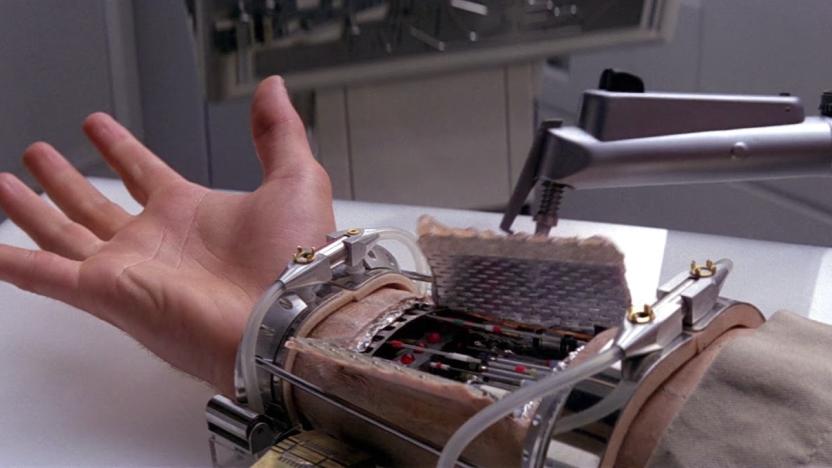Yale University
Latest

Scientists revived organ cells in dead pigs
Scientists have successfully revived cells in some organs for dead pigs, raising hope for longer-lasting transplants.

A new type of switch could be a breakthrough for molecular computing
This could be the first step on the road to molecular computing.

Yale's smart robotic fabric is as flexible as you need it to be
Now a research team out of Yale University has taken the technology one step further with the invention of smart, robotic fabric that can change its shape and stiffness on the fly. The team, led by Dr. Rebecca Kramer-Bottiglio, spun epoxy into fibers that can vary their stiffness thanks to the particles of Field’s metal embedded within them. Field’s metal is novel in that it liquefies at very low temperatures.

Lab-grown blood vessels could make dialysis easier
Dialysis, a common treatment for kidney disease, is far from pleasant, and companies and researchers are constantly working to improve the process. Now, researchers from Humacyte Inc., Duke University and Yale think they're one step closer to using bioengineered blood vessels. These would replace synthetic polymers and donor tissues, which carry risks of inflammation and immune system rejection.

We're not getting Luke Skywalker's prosthetics any time soon
In 1937, robot hobbyist "Bill" Griffith P. Taylor of Toronto invented the world's first industrial robot. It was a crude machine, dubbed the Robot Gargantua (PDF, Pg 172) by its creator. The crane-like device was powered by a single electric motor and controlled via punched paper tape, which threw a series of switches controlling each of the machine's five axes of movement. Still, it could stack wooden blocks in preprogrammed patterns, an accomplishment that Meccano Magazine, an English monthly hobby magazine from the era, hailed as "a Wells-ian vision of 'Things to Come' in which human labor will not be necessary in building up the creations of architects and engineers."

IBM: We're on the cusp of the Quantum Computing revolution (video)
Technology's holy grail is the development of a "perfect" Quantum Computer. Traditional computers recognize information as bits: binary information representing "On" or "Off" states. A quantum computer uses qubits: operating in superposition, a qubit exists in all states simultaneously -- not just "On" or "Off," but every possible state in-between. It would theoretically be able to instantly access every piece of information at the same time, meaning that a 250 qubit computer would contain more data than there are particles in the universe. IBM thinks it's closer than ever to realizing this dream and if you want to know more, we have the full details after the break.

Yale Physicists develop quantum computing error correction, are a qubit pleased with themselves
We're big fans of quantum computing, and hopefully it's about to get a lot more reliable. Researchers at Yale have demonstrated quantum error correction in a solid state system for the first time. Quantum bits were created from "artificial" atoms using superconducting circuits, these qubits are then given either of the typical bit states of "1" or "0," or the quantum state of both simultaneously. The researchers developed a technique that identifies each qubit's initial state, so any erroneous changes can be reversed on the fly. Until now, errors have been a barrier in quantum computing, accumulating and ultimately causing computational failure. A reliable means of fixing these state changes is essential to developing a computer with an exponential speed-up, and fully realizing the quantum dream. The team at Yale hopes that this research might mean its platform of superconducting circuits becomes the one upon which quantum computing is ultimately built. We, on the other hand, just want our parallel universe.

Yale students build spokeless bicycle in one semester, now looking for jobs
Here's something that'll make you think twice before your next bike purchase -- the geniuses (genii?) at Yale University have built a pretty rad spokeless bicycle, which was somehow inspired by the lack of "pictures of a real spokeless bicycle online." Sure, strictly speaking it's just a half-done product due to time (one semester) and budget restraints, but that rear wheel -- driven by the pedals on its geared inner rim -- alone should be enough to make you gasp. Practical hipsters might even be able to fit an electric motor or some sort of container inside the wheel, although we're pretty content with the futuristic hollowness. Either way, the Yale grad who posted these photos is now available for hire, so pay him well and you can have it your way.

Complete Yale courses now on iTunes U
What a great opportunity to brush up on controversies in Astrophysics, Game Theory, or France since 1871. Apple and Yale University have partnered to bring complete Yale courses to iTunes U and they are free for the clicking.Apple was already offering significant quantities of lectures and interviews from Yale, but now complete courses are being offered for free. For now, there are 13 complete courses online, one subject area is composed of about 40-50 separate podcasts. That's a lot of information and precious knowledge.If learning about the American Novel since 1945, or Biomedical Engineering is your thing, click right on over. There is probably something on the list you'll find interesting, to say nothing of the many great lectures.The twists and turns of the digital revolution have been breathtaking to watch. From my home, an office, sitting at an airport, or riding along in a car, bus, plane or train I can take my favorite music, movies, or listen to experts relate the latest discoveries about Black Holes of the history of Psychology. What a world.

First functional quantum processor created, lasted slightly longer than your last Xbox 360
UK researchers said they were getting close earlier this year, but in one brilliant fraction of a second a gaggle of Yalies beat those limeys to the punch, with a team led by Robert Schoelkopf, a professor of Applied Physics at Yale, creating what's being hailed as the first quantum processor to actually perform calculations. It's composed of aluminum atoms grouped together to form two quantum bits, communicating over an unimaginatively named named quantum bus that enables one to change the (wait for it) quantum state of the other. This first qubit shifter was able to maintain state for 1,000 times longer than any previous qubit ever produced -- but since its predecessors could only manage a nanosecond's worth of cognition we're still only talking a microsecond here. In other words: there's still a long way to go before you'll be slotting one of these into your gaming rig.






